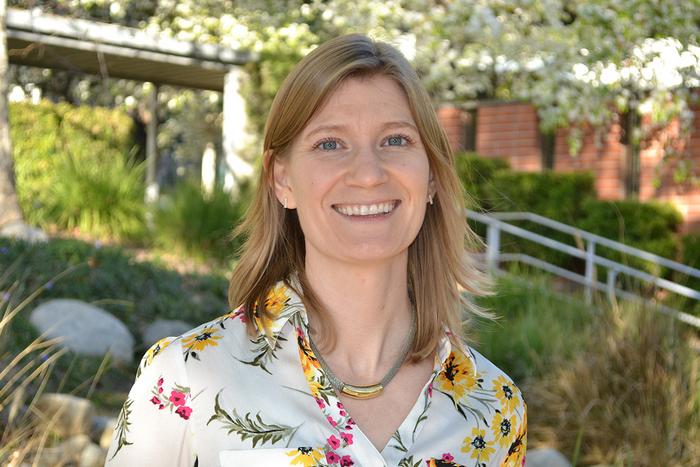SAN ANTONIO — June 11, 2024 —Southwest Research Institute Lead Scientist Dr. Kelly Miller has been selected by NASA to receive its 2023 Planetary Science Early Career Award (ECA). The ECA program supports exceptional early-career scientists who play a meaningful role in the planetary science community in areas relevant to NASA’s Planetary Science Division.
As part of the award, Miller will receive a $200,000 grant to fund professional development including lab work and travel to professional meetings. The grant will also support a community outreach project with middle school students in San Antonio. Her project, “Carbon-Based Connections: From Earth to the Outer Solar System” will educate students about carbon-based connections across the solar system.
Miller plans to integrate her material with curricula created by Natasha Wilkerson and Claire Meschkat called “Mission to Mars” and “Mission to Moon,” which are distributed globally and reach more than 10,000 middle school students around the world. Miller met Wilkerson and Meschkat, education professionals with engineering backgrounds, through the NASA-funded “New Worlds Await You” project led by the Wex Foundation from 2019 to 2022.
“I will be working with Claire (Meschkat) at Vivify on the curriculum development, and then I’ll work with Natasha (Wilkerson) at Cosmic Leap Foundation to pilot and package the lessons,” Miller said. “By project end, they will be distributed through the Space Club Educator’s Portal, which was accessed by teachers in contact with approximately 10,000 middle school students at the time that we submitted the proposal last year.”
The plan is to pilot the material available in the Fall of 2025 at select schools in San Antonio, which will be determined later. Her lessons will include hands-on experiments that tie in with her focus on planetary science and matters connected with human exploration such as resource availability.
“Having the students think about how we would go about looking for water on other planets is just one idea,” she said. “I would like to introduce the lessons here locally and see how it goes so that we can revise the curriculum if needed before we distribute it more widely.”
Miller specializes in researching the distribution and evolution of biologically relevant elements (carbon, hydrogen, nitrogen, oxygen, phosphorus and sulfur or CHNOPS) in planetary systems. Her focus is on the outer solar system planets and smaller objects such as moons and asteroids. She has additional expertise in the composition of Saturn’s rings and the organics that are found there.
Miller is the calibration lead for the Europa Clipper MASPEX instrument and a Europa Clipper project science team affiliate. She has a master’s degree and a Ph.D. in planetary science, both from the University of Arizona. She joined the SwRI staff in 2016.
For more information visit https://www.swri.org/planetary-science.

Credit: Southwest Research Institute
SAN ANTONIO — June 11, 2024 —Southwest Research Institute Lead Scientist Dr. Kelly Miller has been selected by NASA to receive its 2023 Planetary Science Early Career Award (ECA). The ECA program supports exceptional early-career scientists who play a meaningful role in the planetary science community in areas relevant to NASA’s Planetary Science Division.
As part of the award, Miller will receive a $200,000 grant to fund professional development including lab work and travel to professional meetings. The grant will also support a community outreach project with middle school students in San Antonio. Her project, “Carbon-Based Connections: From Earth to the Outer Solar System” will educate students about carbon-based connections across the solar system.
Miller plans to integrate her material with curricula created by Natasha Wilkerson and Claire Meschkat called “Mission to Mars” and “Mission to Moon,” which are distributed globally and reach more than 10,000 middle school students around the world. Miller met Wilkerson and Meschkat, education professionals with engineering backgrounds, through the NASA-funded “New Worlds Await You” project led by the Wex Foundation from 2019 to 2022.
“I will be working with Claire (Meschkat) at Vivify on the curriculum development, and then I’ll work with Natasha (Wilkerson) at Cosmic Leap Foundation to pilot and package the lessons,” Miller said. “By project end, they will be distributed through the Space Club Educator’s Portal, which was accessed by teachers in contact with approximately 10,000 middle school students at the time that we submitted the proposal last year.”
The plan is to pilot the material available in the Fall of 2025 at select schools in San Antonio, which will be determined later. Her lessons will include hands-on experiments that tie in with her focus on planetary science and matters connected with human exploration such as resource availability.
“Having the students think about how we would go about looking for water on other planets is just one idea,” she said. “I would like to introduce the lessons here locally and see how it goes so that we can revise the curriculum if needed before we distribute it more widely.”
Miller specializes in researching the distribution and evolution of biologically relevant elements (carbon, hydrogen, nitrogen, oxygen, phosphorus and sulfur or CHNOPS) in planetary systems. Her focus is on the outer solar system planets and smaller objects such as moons and asteroids. She has additional expertise in the composition of Saturn’s rings and the organics that are found there.
Miller is the calibration lead for the Europa Clipper MASPEX instrument and a Europa Clipper project science team affiliate. She has a master’s degree and a Ph.D. in planetary science, both from the University of Arizona. She joined the SwRI staff in 2016.
For more information visit https://www.swri.org/planetary-science.



